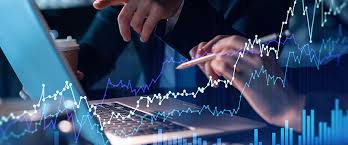The integration of blockchain technology has been a transformative force in the financial industry, revolutionizing the way assets are traded and managed online. However, the impact of blockchain extends beyond the realms of cryptocurrency. In this article, we explore the evolving landscape of online trading, encompassing the revolutionary potential of blockchain and the broader innovations shaping the future of financial markets.
**1. Decentralized Exchanges (DEX):**
Blockchain technology has given rise to decentralized exchanges (DEX), allowing users to trade digital assets directly from their wallets. DEX eliminates the need for intermediaries, providing users with greater control over their assets and fostering a more transparent and efficient trading environment.
**2. Tokenization of Assets:**
Blockchain enables the tokenization of traditional assets, representing ownership in a secure and transparent manner. Real estate, stocks, and commodities can be fractionalized into tokens, providing investors with new opportunities for diversification and liquidity in previously illiquid markets.
**3. Smart Contracts for Automated Trading:**
Smart contracts, self-executing contracts with the terms of the agreement directly written into code, facilitate automated trading on blockchain platforms. These contracts enable trustless transactions and automatic execution of predefined conditions, streamlining and automating various aspects of online trading.
**4. Enhanced Security and Transparency:**
The decentralized and immutable nature of blockchain enhances security and transparency in online trading. Every transaction is recorded on the blockchain, creating an unalterable and transparent ledger. This reduces the risk of fraud and ensures a verifiable record of all trading activities.
**5. Cross-Border Trading Simplified:**
Blockchain’s borderless nature simplifies cross-border trading. With traditional financial systems, cross-border transactions can be complex and time-consuming. Blockchain technology facilitates near-instantaneous transactions and settlements, reducing friction in international trades.
**6. Decentralized Finance (DeFi):**
Decentralized Finance, or DeFi, leverages blockchain to recreate traditional financial services such as lending, borrowing, and trading in a decentralized manner. DeFi platforms operate without intermediaries, providing users with greater accessibility to financial services and opportunities.
**7. Integration of Artificial Intelligence (AI):**
The evolving landscape of online trading is witnessing the integration of blockchain with artificial intelligence. AI algorithms are being used to analyze market data, identify patterns, and execute trades automatically. This fusion of technologies enhances decision-making processes and trading strategies.
**8. Real-Time Settlements:**
Blockchain enables real-time settlements for trades, eliminating the need for lengthy clearing and settlement processes in traditional financial systems. This efficiency not only reduces transaction costs but also minimizes counterparty risks associated with delayed settlements.
**9. Enhanced Liquidity:**
Tokenization of assets on blockchain platforms enhances liquidity by allowing fractional ownership and facilitating secondary market trading. Investors gain the ability to buy and sell fractions of high-value assets, contributing to a more liquid and accessible market.
**10. Regulatory Considerations:**
As blockchain technology continues to reshape online trading, regulatory frameworks are evolving to address the new challenges and opportunities it presents. Governments and regulatory bodies are exploring ways to ensure investor protection, market integrity, and compliance within the decentralized and borderless nature of blockchain-based trading.
In conclusion, the evolving landscape of online trading goes beyond cryptocurrency, with blockchain technology at its core. The integration of blockchain brings forth decentralized exchanges, asset tokenization, and smart contracts, fundamentally altering the way financial markets operate. As innovations like DeFi, AI integration, and real-time settlements further shape this landscape, the synergy between blockchain and online trading holds immense potential for a more inclusive, transparent, and efficient financial ecosystem.


